Legal Scheduling Software: Key Features and Best Tools You Need to Know
Introduction
In the world of legal practice, time is of the essence, and deadlines are non-negotiable. Legal calendar software is the most needed tool for efficient law firm management, as the demand for precise and automated legal calendaring has never been more critical.
The Online Legal Services industry in the US is set to experience significant growth over the next five years. This growth aligns with the broader transformation of the legal sector, where technology-driven solutions are now essential for remaining competitive. Technological advancements will empower online legal service providers by integrating automation and AI into their operations. This will streamline various aspects of their services, from promptly addressing client queries through AI-powered chatbots to automating tasks like document drafting and scheduling.
In this article, we have explored the functions of legal calendars and provided an overview of various planning solutions tailored to law firms of all sizes. Whether you’re a solo practitioner or part of a growing legal practice, understanding the world of legal calendar software is your key to high efficiency. Now, as we dive into this topic, let’s explore the range of options available, from feature-rich paid solutions to user-friendly free tools, to help level up the way law firms manage their schedules.
Good read: Microsoft tools for law firms.
The Need for Legal Calendar Software
Within the legal practice, precision holds the highest importance, and managing appointments, court dates, and deadlines is a complex balancing act. The challenges law companies face include:
- Appointment overload: Lawyers are constantly inundated with appointments, client meetings, court appearances, and deadlines. Keeping track of these commitments can become a logistical nightmare.
- Deadline dilemmas: Missing a crucial court deadline or failing to submit essential documents on time can result in severe consequences, even including disciplinary actions.
- Complex court rules: Different courts have specific procedures that must be followed diligently. Failure to adhere to these rules can lead to dismissed cases or sanctions.
The critical role of legal calendar software
In this high-stakes environment, legal calendar software becomes crucial for law firms seeking to ensure compliance and productivity. This software is specially crafted to address scheduling challenges and provides the following benefits:
- Deadline alerts: Legal calendaring software is equipped to provide automated alerts for upcoming deadlines and appointments, so that legal professionals are always aware of critical dates and obligations.
- Rules-based calendaring: Many legal calendar software solutions are equipped with rules-based calendaring, which means they can calculate deadlines based on jurisdiction-specific rules and court calendars. This minimizes the risk of calendar errors that could result in missed deadlines.
- Efficient resource management: These tools facilitate the allocation of resources, helping law firms optimize their time and personnel for top efficiency.
- Enhanced collaboration: Legal calendaring software often includes collaboration features, allowing team members to share schedules, updates, and information on the go.
Benefits of using legal calendar software
The advantages of incorporating legal calendar software into your law firm’s workflow are numerous:
- Error reduction: By automating scheduling and deadline calculations, legal calendaring software significantly reduces the risk of human error, providing accuracy and reliability.
- Cost savings: Efficiently handling schedules and deadlines minimizes the need for costly last-minute interventions or legal malpractice claims.
- Compliance assurance: With rules-based calendaring and alerts, law firms can ensure compliance with court rules and maintain a stellar professional reputation.
- Productivity boost: Streamlined scheduling and deadline management free up valuable time and resources, so that you can focus on your core responsibilities.
In the next chapter, we will learn more about the features and options when choosing the right calendaring solution for your law firm.
Features and Benefits of Legal Calendaring
Legal calendar software equips law firms with the precise tools they need to succeed in a highly-competitive profession. Now we’ll look into the essential features that set the best legal calendaring software apart, showcasing how they can help with improving efficiency and client service, while elevating timekeeping.
Key features to seek in legal calendar software
- Deadline management: The heart of legal calendaring software, this feature makes sure that crucial court dates, filing deadlines, and appointments are tracked with precision. Look for software that allows you to customize deadlines and rules based on jurisdiction and case specifics.
- Rules-based calendaring: As mentioned earlier, rules-based calendaring automates the calculation of deadlines based on court rules and jurisdictional requirements. This feature is critical as it minimizes the risk of missing critical dates.
- Integration with case management: Seamless integration with your case management system is also vital. This enables real-time updates, so that all team members are on the same page no matter case developments and scheduling changes.
- Automated notifications: Timely reminders about upcoming deadlines and appointments keep your team proactive and prevent costly oversights. Customizable alerts let you tailor notifications to your preferences.
- Resource allocation: This feature includes assigning tasks, managing staff schedules, and optimizing your firm’s capacity to handle multiple cases simultaneously.
- Conflict checking: Built-in conflict checking features prevent scheduling conflicts and ethical violations, so that your firm avoids situations where there could be issues with representing clients.
- Billing and timekeeping integration: This integration streamlines the process of tracking billable hours, reducing administrative overhead.
The benefits of these features are clear: enhanced efficiency through reduced administrative tasks, accurate timekeeping for optimized revenue generation, improved client service and professional reputation, risk reduction via rules-based calendaring, and streamlined collaboration. In the upcoming chapters, we’ll explore the market options, guiding you to make an informed choice when selecting the best legal calendaring software for your requirements.
Choosing the Right Legal Calendar Software
Choosing the right legal scheduling software during a digital transformation can be challenging for law firms. In this chapter, we’ll help you make this crucial choice by listing the key factors to consider, ensuring the selected software aligns with your needs. We’ll also provide top legal calendaring software options for firms of various sizes.
Factors to consider when choosing legal scheduling software
- Scalability: Choose software that can adapt to your growing needs as your practice expands. Scalable software remains an asset rather than a limitation.
- Integration capabilities: Seamless integration with other tools like case management software, billing systems, and document management solutions, is highly important. A well-integrated system minimizes data entry duplication and generally saves your time.
- User-friendliness: An intuitive interface allows team members to start using the software to its full potential quickly, without feeling frustrated.
- Customization: Look for software that allows you to tailor the calendering process to your firm’s requirements, including custom rules, notifications, and reporting.
- Cost-effectiveness: Assess the cost of ownership, including subscription fees, training, and hidden costs. Make sure that the benefits you get justify the investments.
Top legal calendaring software options
Here are some of the best legal calendaring software options available, each with its unique features and strengths:
- Clio offers a comprehensive suite of legal practice management features designed to streamline your law firm’s daily operations. With Clio, you can effortlessly manage client intake, CRM, time tracking, document management, billing and invoicing, online payments, calendar management, secure client communications, and more. Clio offers integrations, award-winning support, industry-leading security, and guaranteed reliability. Suitable for firms of all sizes.
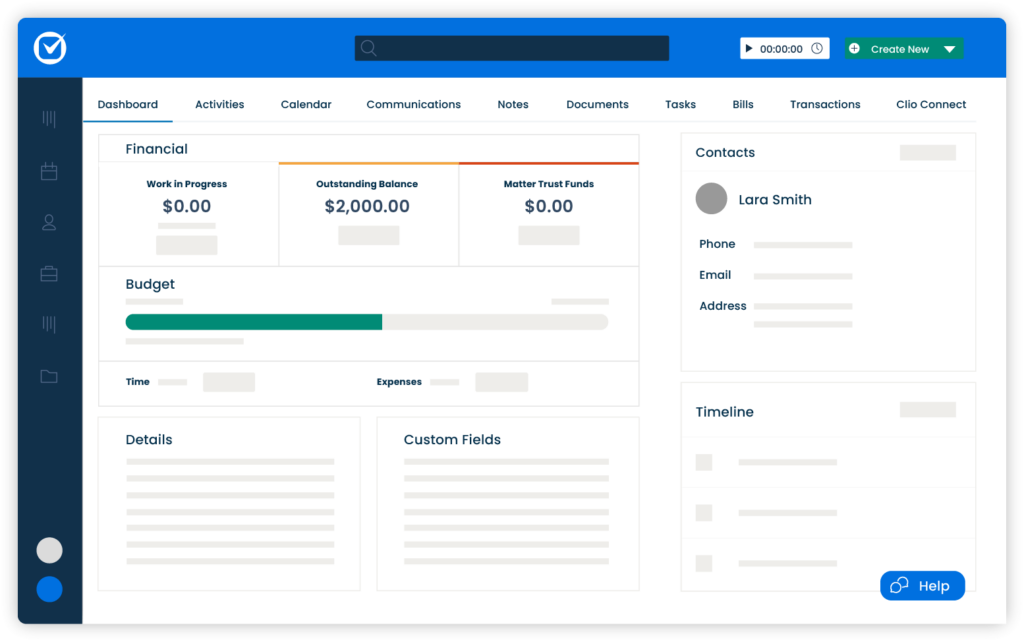
Source: https://www.capterra.com/p/105428/Clio/
- MyCase is an all-in-one solution for law practice management, covering every aspect of your firm’s daily operations. With MyCase, you can seamlessly manage client intake, CRM, time tracking, document management, billing, online payments, calendar management, secure client communications, and more. MyCase is ideal for small to medium-sized law firms.
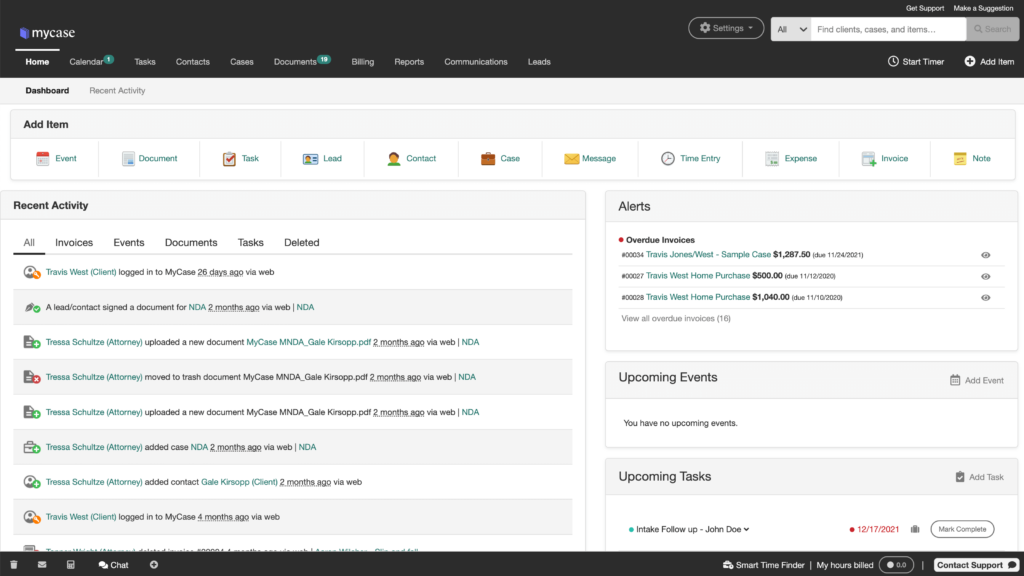
Source: https://www.capterra.com/p/115613/MyCase/
- Virto Calendar Overlay is your comprehensive solution for efficient calendar management. This tool seamlessly integrates with your existing systems, allowing you to consolidate and streamline your scheduling tasks. With Virto Calendar Overlay, you can easily manage multiple calendars, appointments, and events, ensuring your team stays organized and on track. This tool is suitable for companies of all sizes, from small businesses to large enterprises.
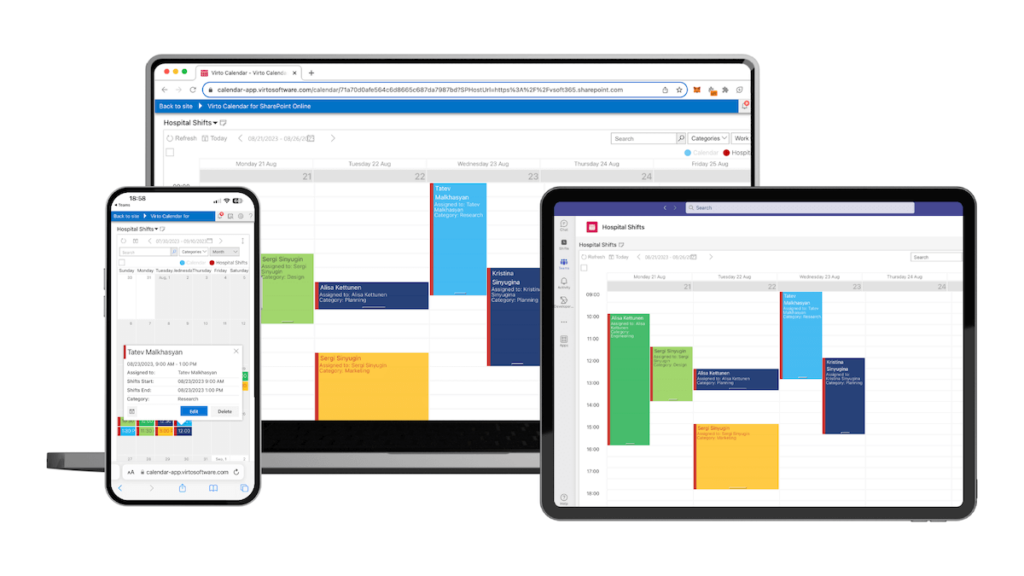
- PracticePanther offers legal practice management for firms of all sizes. With PantherPayments, streamline online payments and accelerate your cash flow. Automate client intake for efficient communication and appointment scheduling. Benefit from automated workflows, saving you over 8 hours per week. Leverage customized tags and reporting for valuable insights. Seamlessly manage complex cases with intuitive case management tools.
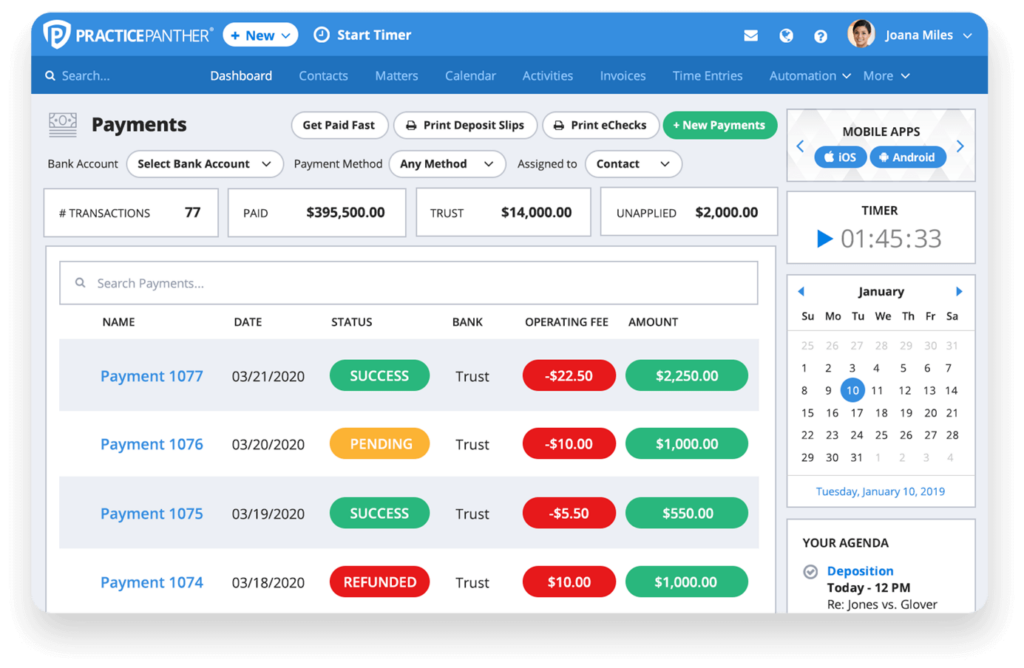
Source: https://www.practicepanther.com/pantherpayments
- CosmoLex offers essential tools to modernize your law practice. Its legal-specific CRM enhances client intake and engagement. Capture billable time with ease and never miss a minute with Timekeeping tools. Simplify document management and creation while enhancing security. Manage calendars and workflows efficiently. Ensure trust accounting compliance effortlessly. Tailored back-office accounting meets law firm needs. CosmoLexPay streamlines payments with no compliance concerns.
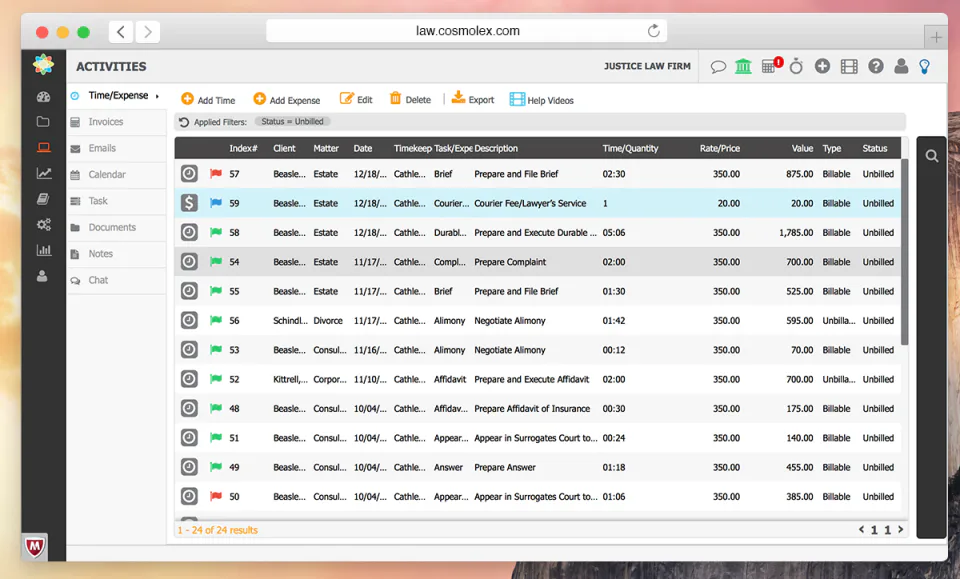
Source: https://www.getapp.com/legal-law-software/a/cosmolex/
- Rocket Matter streamlines legal case management with accessible client data, document storage, and efficient billing. Utilize Kanban Boards and advanced reporting for insights. Simplify time tracking with Bill-As-You-Work™. Store and share documents securely, automate workflows, and streamline invoicing. Enjoy rapid payments and efficient e-signatures.
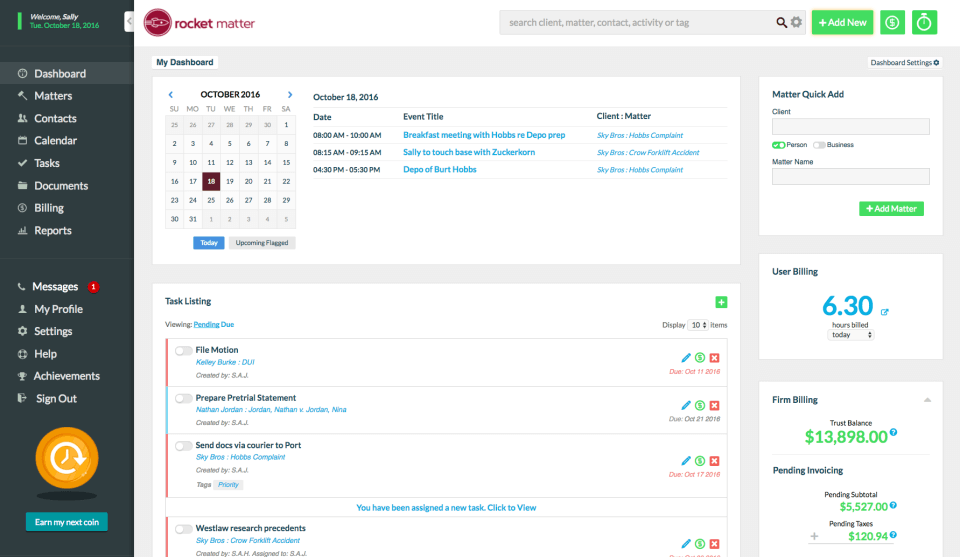
Source: https://www.capterra.com/p/82112/Rocket-Matter/
- Time Matters offers adaptable practice management software. Customize workflows, generate documents, and set task triggers. Optimize information sharing and reduce malpractice risks. Control data access and create custom reports. Capture more billable hours and boost efficiency. Stay connected with the Time Matters Go app. Time Matters is a trusted choice for legal professionals, providing tailored solutions for law practices of all sizes.
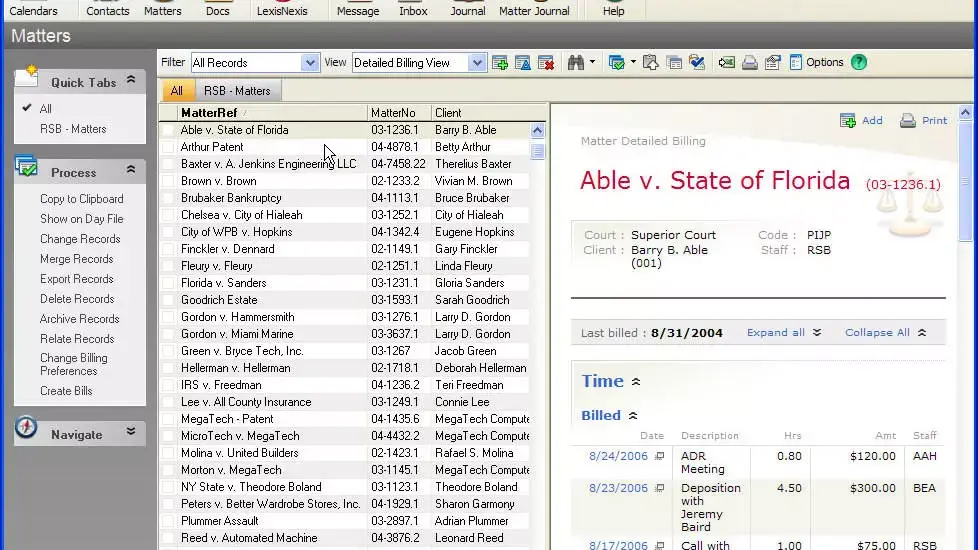
Source: https://uptimepractice.com/time-matters-review/
- Legal Files simplifies legal case management with centralized features. Manage files, integrate emails, and generate reports effortlessly. Benefit from automation with workflows and alerts, while organizing case documents efficiently. Standardize processes, enhance productivity, and ensure top-tier organization. Enjoy team support, customization, remote access, and insightful reports for efficient operation management.
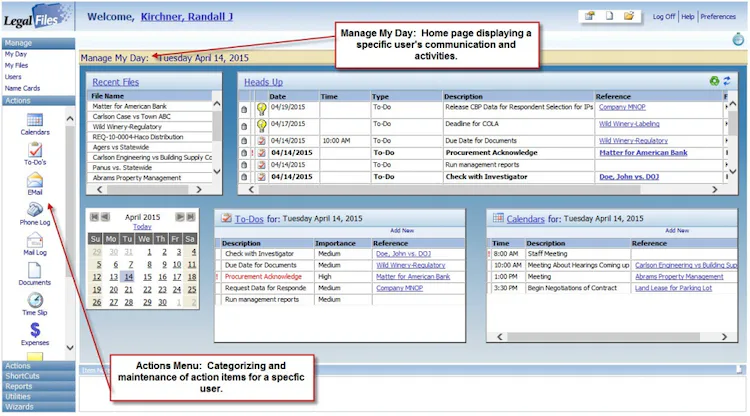
Source: https://www.getapp.com/legal-law-software/a/legal-files/
- ProLaw provides legal practice management, offering key benefits like financial reporting, application integration, and case management. Take control of your finances with automated tools, improve decision-making with real-time insights, and maintain an up-to-date client database. Protect your clients and your firm with item-level security, insurance savings, and advanced calendaring.
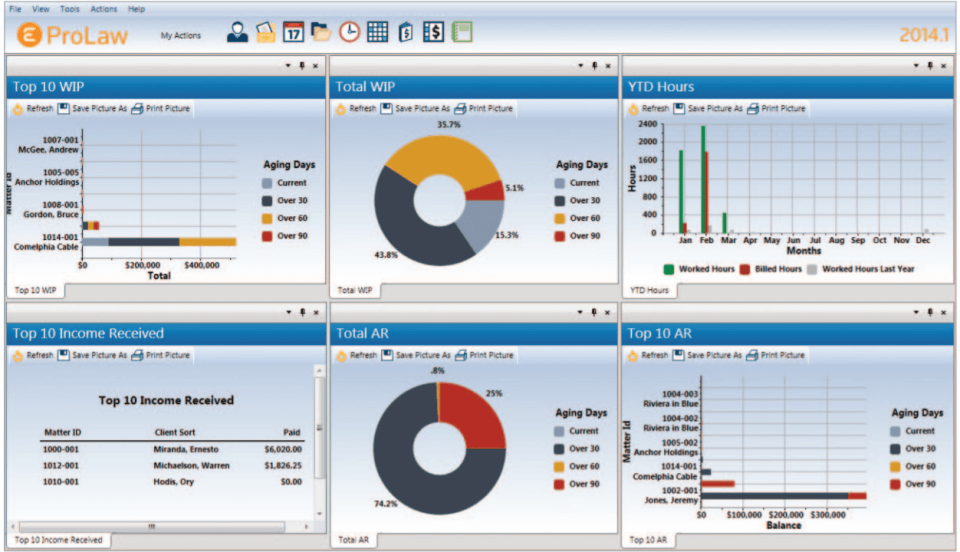
Source: https://www.capterra.com/p/35611/ProLaw/
- AbacusLaw serves firms of all sizes with advanced calendaring and automation features. Capture well-organized client information, automate workflows, and ensure precise follow-ups. Manage finances effortlessly with built-in accounting tools and meet trust accounting requirements. Stay organized with easy-to-update calendars and Microsoft Outlook integration. Track expenses accurately and generate professional settlement statements. Simplify payment processing with APX, ensuring rapid and secure transactions.
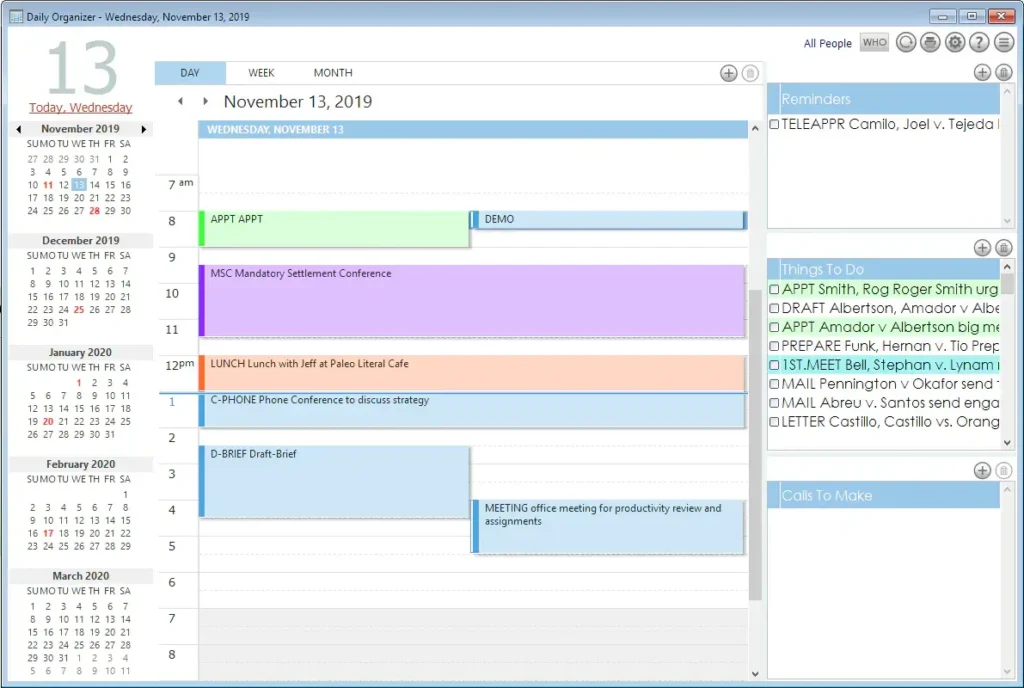
Source: https://www.getapp.com/legal-law-software/a/abacuslaw/
- CARET Legal (Zola Suite) is a cloud-based practice management solution for law firms. It offers integrated matter management, CRM, time tracking, billing, and more. Centralize firm and client data, prepare digital invoices, and gain complete case visibility. It prioritizes security, complies with SOC 2 standards, and supports quick client onboarding. Access all features via a mobile app for global reach.
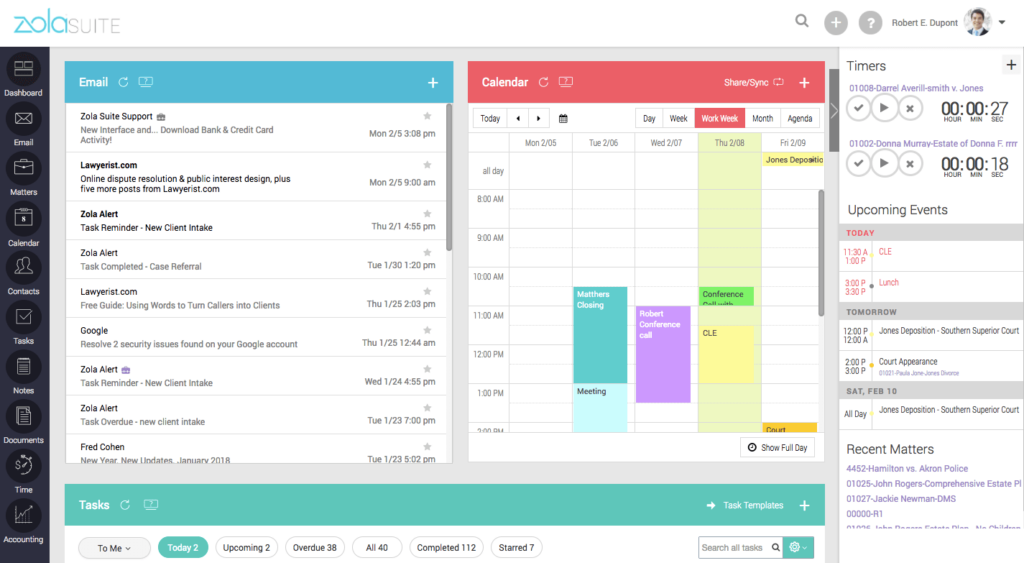
Source: https://www.softwareadvice.com/legal/zola-suite-profile/
Top choices for law firms of different sizes
- Solo practitioners: Consider MyCase or CosmoLex for their user-friendly interfaces and cost-effectiveness.
- Small to medium-sized firms: Options like Clio, PracticePanther, Zola Suite and Virto Calendar Overlay app offer a balance of features and scalability.
- Mid-sized to large firms: Virto Calendar Overlay, ProLaw, Legal Files, and AbacusLaw provide advanced calendaring and customization options for larger practices.
As you start selecting legal calendar software, remember to assess your company’s needs, consult with your team, and consider the long-term benefits of your choice. The right software can become a game changer in terms of productivity for your law firm.
Free Legal Calendaring Tools
Not every firm, especially smaller practices, can afford the expense of premium calendaring software. Now we will explore some free options, highlighting notable tools, and assist you in determining when a free tool might be enough and when a paid solution is essential.
Notable free legal calendaring tools
- Google Calendar: Google Calendar is a popular choice for its user-friendly interface and accessibility. With it, you can create events, set reminders, and share calendars with colleagues in a couple of clicks.

Source: https://workspaceupdates.googleblog.com/2022/05/improved-experience-for-working-location-in-google-calendar.html
- Outlook Calendar: Microsoft’s Outlook Calendar is another widely-used tool that offers basic scheduling features. It integrates seamlessly with the Microsoft ecosystem.

Source: https://insider.microsoft365.com/es-mx/blog/starting-to-support-third-party-accounts-in-new-outlook-for-windows-preview
- Zoho Calendar: Zoho Calendar provides a cloud-based solution with features like event creation, shared calendars, and reminders. It’s suitable for small to medium-sized law firms.

Source: https://help.zoho.com/portal/en/kb/projects/calendar/articles/calendar#Create_a_New_Event
- Bitrix24: Bitrix24 is a free collaboration and project management platform that includes a calendar tool. It offers features for scheduling events, tasks, and client management.
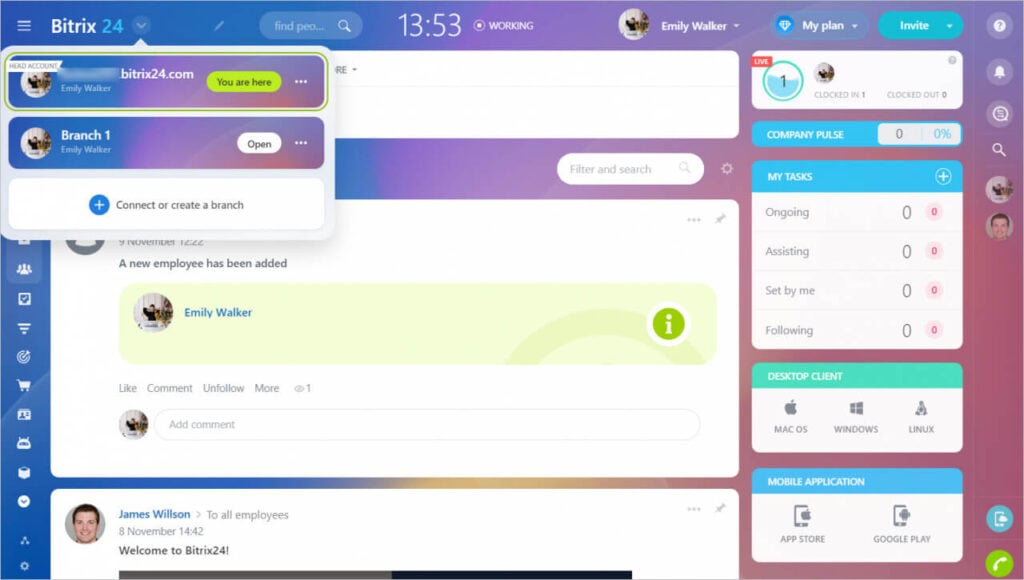
Source: https://helpdesk.bitrix24.com/open/16834444/
- Kolab Groupware: An open-source groupware suite, Kolab includes a calendar component that can be used for managing appointments, events, and tasks. It’s a more advanced option for those seeking open-source solutions.

Source: https://kolab.org
Pros of free legal calendaring tools
- Cost-efficiency: The most apparent advantage of free legal calendaring tools is, of course, their cost – they’re free to use. This is quite an argument for those working with tight budgets.
- Basic scheduling: Many free tools offer essential scheduling features, such as setting appointments, tracking court dates, and receiving reminders. These can help you stay organized without the need for additional investments.
- Ease of use: Free tools usually prioritize simplicity, making them accessible and user-friendly, even for those with limited technical knowledge.
- Cloud-based access: Some free options offer cloud-based access, allowing you to manage your calendar on the go.
Cons of free legal calendaring tools
- Limited features: Free tools tend to lack the robust features found in paid software, such as rules-based calendaring, advanced customization, and integrations.
- Data security concerns: Depending on the tool, data security may be a concern. It’s essential to research the tool’s privacy and security measures to protect client information.
- Scalability: Free tools may not be suitable for larger or growing firms, as they may lack the scalability. Additionally, some tools have limitations on the number of free users.
- Limited support: Free calendars often come with limited customer support, which can be a challenge when you need any assistance.
When a free tool might suffice
- Solo practitioners: If you’re a solo practitioner with a limited caseload, a free tool can be an excellent way to stay organized without spending a penny.
- Small firms on a budget: Small law firms with minimal caseloads and tight budgets can also benefit from free tools and their convenient basic features.
- Temporary or low-volume needs: If you have a short-term or low-volume need for calendaring, a free tool can suffice without making any financial commitments.
When a paid solution is essential
- Complex caseload: For firms handling a complex caseload with multiple deadlines, court rules, and frequent scheduling changes, a paid solution is essential.
- Data security and compliance: If you handle sensitive information, a paid solution with security measures and compliance features is necessary to protect client data.
- Scalability: Growing firms or those with an expanding caseload should invest in a paid solution that can scale with their needs.
- Integration requirements: If your firm relies on integrated software solutions for case management, billing, or document management, a paid calendaring tool that seamlessly integrates with these systems is your choice.
Free legal calendaring tools can be a go-to choice for solo practitioners and small law firms with limited budgets and needs. However, as your firm grows, or if you handle sensitive data and complex caseloads, investing in a paid solution becomes a necessity. Carefully assess your firm’s needs and budget to make the best choice for your calendaring requirements.
Legal Calendar Software for Attorneys
Attorneys and solo practitioners work in a busy professional landscape, marked by packed schedules and client demands. Now let’s look at the distinct needs of lawyers when it comes to managing their calendars. We’ll also mention software options specially designed to cater to individual legal professionals.
Specific needs of attorneys and solo practitioners
- Client appointments: Attorneys often schedule client meetings, consultations, and follow-ups. Efficiently managing these diverse appointments is crucial to providing top client service.
- Court appearances: Court dates and appearances are non-negotiable. Missing a court date can have severe consequences, making precise calendaring and reminders essential.
- Task management: Attorneys juggle multiple tasks, from research and document preparation to court filings and case analysis. An organized calendar helps in effective prioritization.
- Billing and timekeeping: Accurate timekeeping is vital for billing clients and tracking billable hours. An integrated calendar can simplify this process.
- Client communication: Attorneys must stay in constant communication with clients. Reminders and notifications help with timely interactions.
Software options tailored for attorneys
- Clio: Clio is a comprehensive practice management software that caters to the specific needs of attorneys. It offers calendaring features, integrates with billing systems, and includes client communication tools.
- MyCase: MyCase is designed with solo practitioners and small firms in mind. It provides an intuitive calendaring system, along with case management and client communication tools.
- PracticePanther: PracticePanther offers a user-friendly interface, ideal for attorneys seeking an efficient calendaring solution alongside practice management features.
- Virto Calendar Overlay: Virto Calendar Overlay is a calendar for Microsoft ecosystem, including Microsoft Teams, that offers flexibility and customization for law firms. It provides a unique calendaring experience, ideal for firms seeking seamless integration with their existing systems.
- Rocket Matter: Rocket Matter focuses on solo practitioners and small firms, offering calendaring, timekeeping, and billing integration for attorneys on the go.
- Time Matters: Time Matters provides advanced calendaring capabilities, making it suitable for attorneys managing complex caseloads and multiple deadlines.
All in all, attorneys and solo practitioners require calendar software that can keep up with their demanding schedules and diverse responsibilities. These software options cater to the unique needs of legal professionals, ensuring they can efficiently manage their calendars while focusing on delivering exceptional service and winning cases.
| Features | Clio | MyCase | PracticePanther | Rocket Matter | Time Matters | Virto Calendar Overlay |
|---|---|---|---|---|---|---|
| User-Friendly | Yes | Yes | Yes | Yes | Yes | Yes |
| Scheduling | Yes | Yes | Yes | Yes | Yes | Yes |
| Rules-Based | Yes | No | No | No | Yes | Yes |
| Integration | Extensive | Limited | Extensive | Moderate | Extensive | SharePoint Integration |
| Customization | Extensive | Limited | Extensive | Limited | Extensive | Highly Customizable |
| Client Portal | Yes | Yes | Yes | Yes | Yes | Yes |
| Billing | Yes | Yes | Yes | Yes | Yes | No |
| Mobile App | Yes | Yes | Yes | Yes | Yes | Yes |
| Task Management | Yes | Yes | Yes | Yes | Yes | Yes |
| Security Measures | High | High | High | High | High | High |
| Customer Support | Excellent | Good | Good | Good | Good | Customer Support Available |
| Price Range | Starting at $49/user/month | Starting at $39/user/month | Starting at $49/user/month | Starting at $55/user/month | Pricing available upon request | Starting at $625/30 users/ year |
| Free Version | No | No | No | No | No | Yes |
Conclusion
Legal calendar software is a vital tool, offering precision and reliability in managing the host of appointments, court dates, and deadlines. Now, we encourage you to embark on your journey to discover the ideal calendaring software for your law firm. Research your options, explore trial, and seek recommendations from colleagues to make an informed choice that aligns with your firm’s objectives.
Lastly, we’d like to draw your attention to the Virto Calendar App for MS Teams calendar solution mentioned earlier. If your firm uses Microsoft 365 and seeks a customizable calendaring tool that integrates with your existing systems, Virto Calendar Overlay is worth exploring. It offers features that can be tailored to any of your calendaring needs, providing a flexible solution for legal professionals.
In the legal sphere, time is often the most valuable asset. With the right legal calendar software, you can optimize your time management, reduce the risk of errors, and focus on delivering exceptional legal services to your clients.





